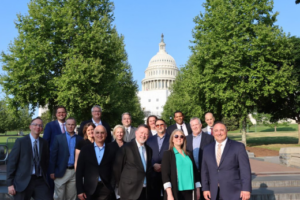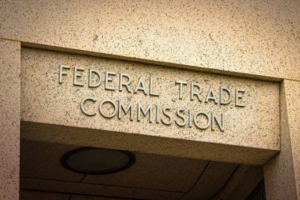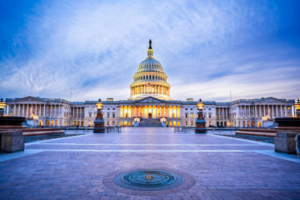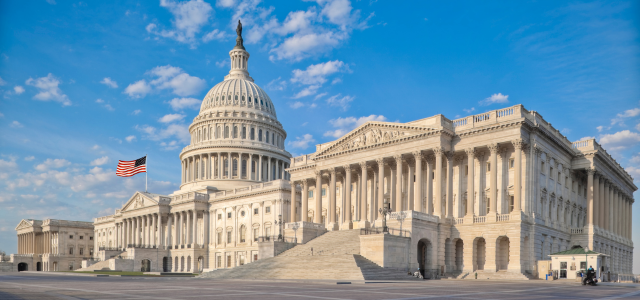
Digital Advertisers and Publishers Descend on D.C.

Digital advertising and the ad-supported internet have transformed the economy, reducing costs and opening access to more platforms, helping small businesses and online creators to reach more customers and bigger audiences. According to IAB research, the internet economy supports over 17 million jobs. Small businesses and the self-employed represent the largest share. American consumers, too, benefit from increased choice, competition, and convenience. Data-driven digital advertising matches web users with preferred products and services, personalizing the online experience, and supporting free news, entertainment, email, and more, amounting to thousands of dollars of free online content and services annually.
Today, there are more opportunities than ever before for individuals to connect, learn, express themselves, and pursue their interests. Even during the pandemic, small business growth set a record, thanks largely to digital advertising-enabled online entrepreneurialism. But the narrative in Washington, D.C., is different. For decades, federal policy has fostered the free-and-open internet, establishing U.S. technological leadership and today’s Information Economy. Now, politicians of both parties are seeking more control. Legislation and regulation to punish “Big Tech” – rules to restrict or eliminate essential data, personalized advertising, and ad market innovation – would have outsized effects on small businesses, cementing the power of the biggest companies with resources to withstand a regulatory onslaught.
Interactive Advertising Bureau has been busy on Capitol Hill sharing the stories of small business owners, independent publishers, and online creators, who depend on digital advertising and ad revenue to succeed. IAB’s Public Policy Team in Washington, D.C., has introduced dozens of U.S. Senators, Representatives, and their staff to their constituents in communities across the country, where digital advertising is helping people of every background and industry to break down barriers, enter new markets, and realize their dreams.
Internet for Growth, a grassroots, nationwide coalition, includes everyone from local realtors and retailers, to health and fitness coaches, to boutique advertising and marketing firms. In May, many Internet for Growth members visited the capital for the first time to advocate for digital advertising, flying from as far as Arizona and California to promote our industry’s importance to Main Street, USA, not just Silicon Valley or Madison Avenue. With inflation still elevated, coalition members warned Members of Congress about bills that would raise advertising and consumer costs. Long-term, the danger is greater. Bills to ban “surveillance advertising” and abolish integrated ad platforms would set back U.S. internet policy decades.
IAB is grateful to all the small businesses, start-ups, and mom-and-pop shops donating their time to advocate for our under-appreciated industry in Washington, D.C. Policymakers are listening. If you’d like to learn more about Internet for Growth and how to help, please contact Brendan Thomas at IAB.
Related Coverage:
Small Business Owners to Congress: Protect Digital Advertising (Internet for Growth)
Internet for Growth Announces Small Business Advisory Council (Yahoo News)
America Better Off Without “America Act”

Last year, Congress refused to vote on the Competition and Transparency in Digital Advertising Act (CTDA), a bill that would abolish integrated advertising platforms, which help advertisers make sense of virtually limitless opportunities online and direct their ad dollars efficiently and effectively. At the same time, web publishers, especially small ones unable to afford sales teams or complex technology, rely on the same platforms to connect with buyers. In the middle are ad exchanges facilitating transactions. The system has allowed online content and commerce to flourish, rewarding great customer experiences and ad environments.
Nevertheless, its sponsors re-introduced the CTDA this year as the AMERICA Act, short for the Advertising Middlemen Endangering Rigorous Internet Competition Accountability Act. As unwieldy as its title suggests, the bill would limit innovation and competition in ad markets just as retail, entertainment and other companies are rushing to offer their own integrated advertising platforms. No matter the industry, the most successful companies in today’s online economy are also media and technology companies.
Narrowly focused on the current politics of “Big Tech,” the AMERICA Act ignores both the past and future of digital advertising — its role harnessing a cacophony of online commercial opportunity, as well as a growing number of companies offering integrated ad platforms. The market share of the largest has fallen due to increased competition. Even so, the AMERICA Act attacks an entire industry, not just a few successful companies. The bill would discourage smaller tech firms from experimenting and place artificial limits on growth. As a result, ad buyers and sellers would confront a slew of inoperable technologies, higher ad costs and lower revenue, hitting the creator economy especially hard. Small publishers, video and audio streamers rely on the reach and scale of integrated ad platforms.
The AMERICA Act would complicate efficient ad markets and ecosystems that continue to evolve. Partnering with organizations like Internet for Growth, IAB is working to make sure Congress rejects this bill again.
EU-U.S. Data Deal: Done

Every American company should pay attention to the EU’s recent Meta fine, underscoring threats to digital advertising, the data-driven global economy, and the need for a trans-atlantic data agreement between the U.S. and EU. As the EU finalized the Tran-Atlantic Data Privacy Framework, which President Biden proposed last year, the Irish Data Protection Commission (DPC) fined Meta a record $1.3 billion, ordered the company to stop transferring Europeans’ data to the U.S., and ruled that Standard Contractual Clauses that have protected U.S. companies from punishment may no longer meet EU data privacy requirements.
Internationally, as domestically, fights over data privacy are bigger than Big Tech, affecting every online, data-driven industry. Thanks to lightning-speed internet, digital advertising, and e-commerce tools, even the smallest businesses are trading overseas. Before EU courts struck it down, the Privacy Shield helped small and medium-sized American businesses — 70 percent of the total — meet EU requirements. However, after lengthy negotiations to replace the Privacy Shield, EU regulators threatened to overrule the President’s latest proposal, citing human rights concerns. To address them, the Trans-Atlantic Data Privacy Framework reforms U.S. intelligence collection. The real issue may be economic protectionism. EU data laws could have forced U.S. companies to relocate data infrastructure to Europe, cost-prohibitive for all but the largest.
As always, battles over Big Tech would disproportionately harm small and medium-sized businesses, not to mention ordinary internet users. Without a new EU-U.S. data agreement, the internet would be less free, less open. With trillions of dollars of international trade at stake, IAB urged EU decision-makers to approve the President’s solution quickly. Thanks to the Biden Administration’s hard work, negotiators have completed an agreement, helping American firms to avoid penalties, lost revenue, and opportunities abroad. On behalf of our members and many more American companies and their customers, IAB is very pleased with the result. This new data transfer agreement between historic allies is the strongest yet.
Sub-Par Subscription Rules

Personalized advertising, seamless e-commerce, and easy online subscriptions are hallmarks of today’s internet economy, helping businesses and customers interact, transact, and establish lasting relationships. However, proposed rules from the Federal Trade Commission (FTC) would introduce mountains of legalese and procedural hurdles to automatic subscription renewals, deterring customers from purchasing any products, services or subscriptions at all.
The FTC cites several egregious examples of abuse, but the public record is too thin, and the FTC’s authority is too narrow, to support sweeping rules for internet publishing, media streaming, cloud gaming, and other online industries — rules appearing to exempt traditional industries. The blow to digital-first companies of all kinds, including small businesses and online creators offering online subscriptions, could be severe. Because the FTC failed to provide sufficient notice, or conduct an economic analysis as required by law, IAB filed a public comment calling for more study and public hearings.
We identify numerous misunderstandings of the internet economy, as well as legal problems, demanding at least a pause in implementation. Free trials, easy enrollments, auto-renewals, and accruing benefits save Americans time and money. Cost savings and convenience are the essence of an online subscription model that has become ubiquitous. However, in its quest to eliminate fine print, the FTC would require more of it, and inflexible forms and procedures across a variety of devices and experiences. It’s almost impossible to imagine implementing cumbersome rules in a voice-activated environment of connected devices and subscriptions. Canceling a subscription is typically much simpler than what the FTC is proposing.
Agency rules could even prevent businesses from offering customers a better deal. For all of these reasons and more, IAB is urging the FTC to reconsider its plan for auto-renewals and focus its resources on punishing bad behavior, according to the agency’s clearly defined authority
Related Coverage:
IAB Calls for Economic Analysis, Public Hearings After FTC “Negative Options” Announcement (Nexttv)
Proposed FTC Auto-Renewal Rules Restrict Commercial Speech, Says IAB (MediaPost)
Digital Advertising is Fundamental

To increase understanding of digital advertising and the online economy on Capitol Hill, IAB has introduced dozens of U.S. Senators, Representatives, and their staff, to small business owners, independent publishers, and online creators. This month, IAB will introduce brand-name publishers to Congress to stress the need for a pro-jobs, pro-growth federal data privacy law. We’re also hosting congressional staff at a digital education series off the Hill. IAB’s efforts to promote digital advertising have dramatically expanded in the capital.
Our Washington, D.C., audience should be receptive. Not only is data-driven digital advertising crucial to local economies, as well as the national economy, political candidates rely heavily on digital advertising to reach voters. Connected TV is becoming more important too, but in Congress, elected leaders are poised to pass privacy legislation that could make it more difficult for people of every political persuasion to advocate for candidates and causes online. As IAB often argues, not only is digital advertising commercial speech, it’s also free speech and a democratizing force. IAB’s congressional education series will cover the technical basics for policymakers and explain how federal legislation and regulation could enable more Americans to thrive in our modern economy and participate in our democracy, a timely message as Congress returns to work after the Fourth of July holiday.
More IAB Public Policy News :
Without the Right Precautions, Influencers Could be at Risk for Legal Trouble (AdExchanger)
AI Regulation – How Brands Can Prepare for Impending Policy (Ad Age)
FTC Makes Rare Appearance at IAB Public Policy and Legal Summit (Marketing Brew)



